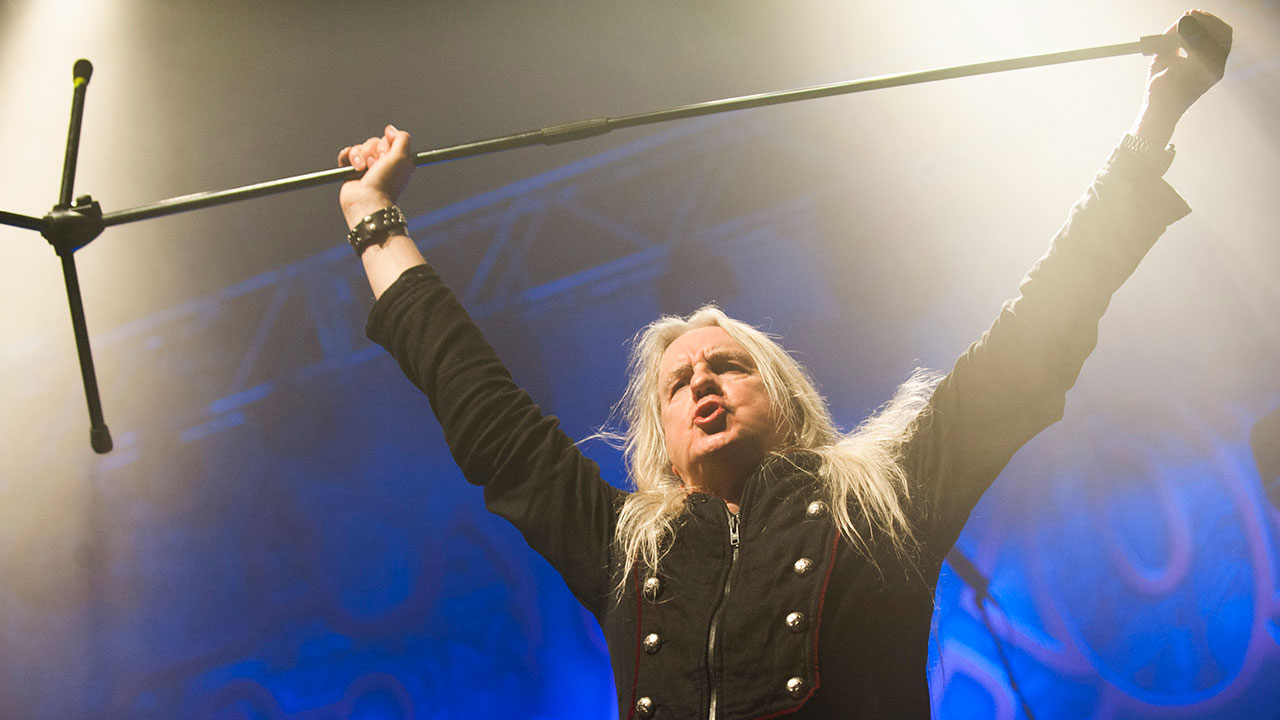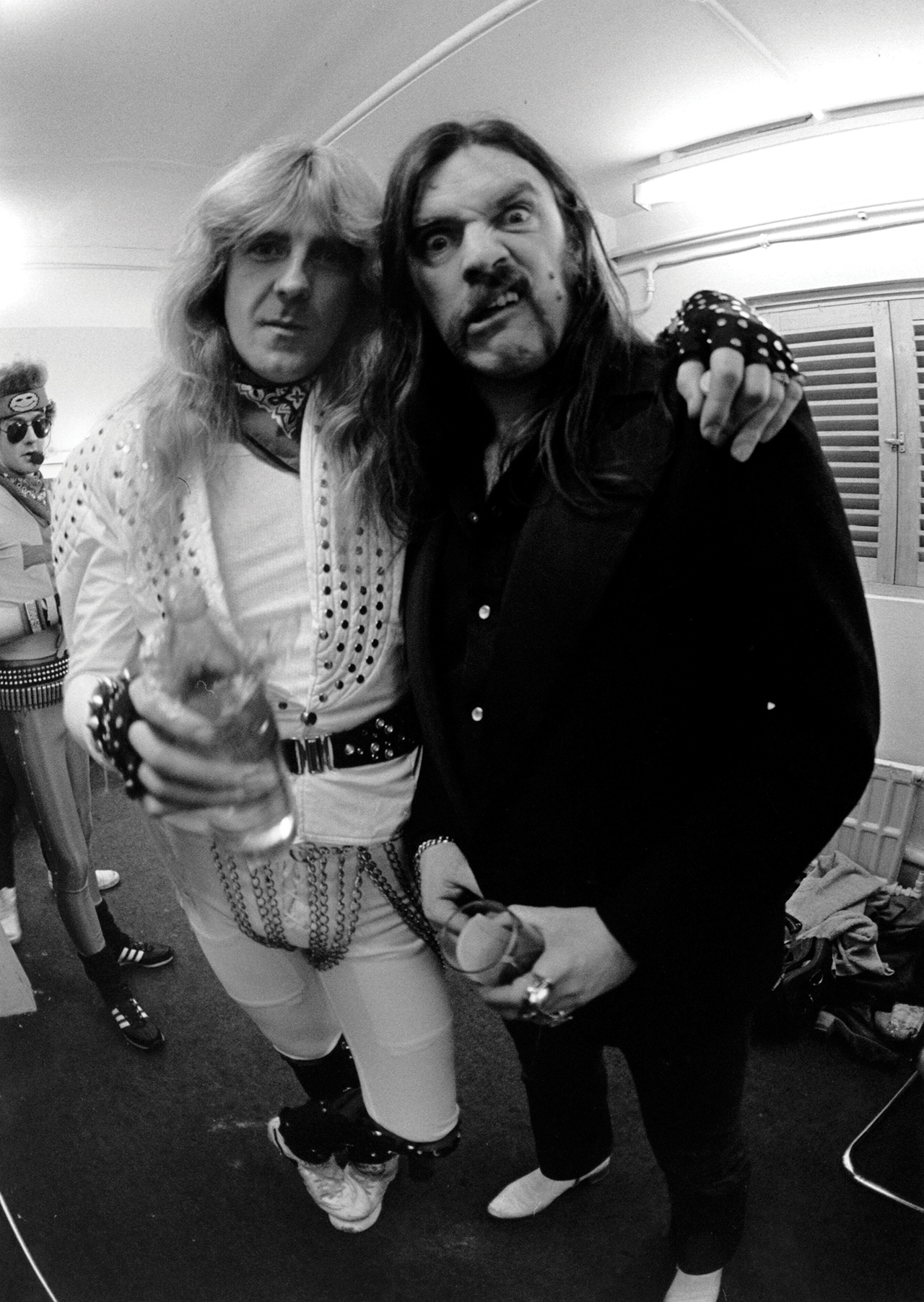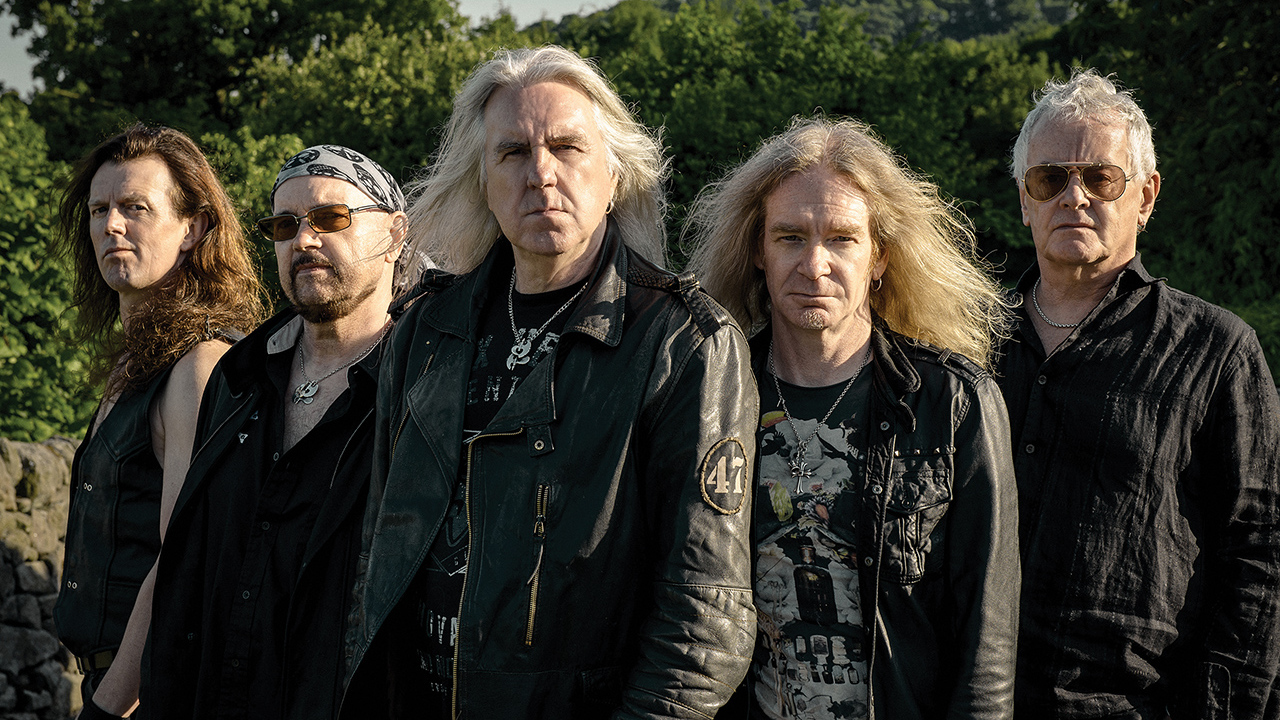On January 15 this year, the singer of one of Britain’s greatest heavy metal bands turned 65. Peter Rodney Byford, known to friends and fans as simply Biff, has led Saxon, who have released more than 20 studio albums, for 38 years through thick and thin. He was born in the old mining town of Honley, West Yorkshire and now lives 100 miles away in the seaside town of Whitby. He is one of rock’n’roll’s true working-class heroes, and this is his world view.
YORKSHIRE ISN’T JUST A PLACE, IT’S A STATE OF MIND
Being a Yorkshireman means you tell it like it is. That’s the cliché. Or you tell it how you think it is, which is slightly different. In the last ten or twenty years, Northern accents have become a lot cooler than they were. Now, a lot of TV presenters have quite broad accents, instead of the old posh BBC style. At one point you were considered stupid if you had a Northern accent. That’s gone now.
IT WASN’T ALL GRIM UP NORTH IN THE OLD DAYS
I liked working in the factories when I was young. My mates were there, and there were lots of girls around – hundreds of women in the weaving sheds. It was a happy environment. And the local pub was where all the real fun happened. Even when I was too young to go in there, I’d hang around outside with my mates and people would bring us a beer. It was a different time then. It was safe as well.
HARD TIMES ARE JUST A FACT OF LIFE
My mum died when I was eleven. That was tough at such a young age. She was a musician, a pianist, so in my early years I was always surrounded my music, and that was something that stuck with me. To be honest, I can’t think how it would have gone if my mum would have lived. What happens is you grow up fast.

ROCK’N’ROLL IS A FORM OF THERAPY
As a kid I was very shy, but when I started playing music, a lot of that shyness went. First I played guitar, then I moved to bass and then I started singing. I became more confident when I was in my late teens and I started playing in bands in front of audiences – and in front of no audiences as well! I still get nervous before a gig, but I have ways of getting around it – having a drink, shouting, jumping up and down, taking the mickey out of somebody, whatever works.
START WITH CHUCK BERRY AND THE BLUES
I was indoctrinated into blues at quite an early age. I had a great music teacher at school. He played blues albums in lessons. And my best friend’s brother was in a band playing Chuck Berry and Muddy Waters stuff, so I learned how to play Johnny B. Goode by the time I was fourteen – not long after Chuck Berry recorded it, actually. I also had a neighbour that played banjo, which has the same tunings as a bass, and he showed me quite a lot of stuff I could play. All of these people were influential in turning me on to music. And my mind was open to taking it all in.
IF ONE BAND FAILS, JOIN ANOTHER
At one point in the early seventies, I was in three different bands at the same time. One band wanted me to play flute, so I learned how to – quite badly, really. There was also a drummer I used to jam with. It was just two of us – a bit like an early version of Royal Blood – by necessity, because we couldn’t find a guitarist. The real turning point for me was when I joined the Iron Mad Wilkinson Band and met Paul Quinn. He was the best guitarist in the area – blues-based, but really off the wall and bit out there. After a while Paul and I started a new band called Coast, and that led to us forming Son Of A Bitch and then Saxon.
DRUGS ARE OVERRATED
As a young guy I never got into drugs because the village I was in didn’t have any. It was just a coal mine and a factory, and a village built around it. There were no drugs, just a load of booze – that was the drug of the day. Paul Quinn and I tried a few things in our early bands. We did a bit of cocaine and smoked cannabis quite a lot, as young lads do, but it didn’t turn into a habit. We just threw ourselves into the music. And there were lots of girls around. So that was what we were into – the sex and rock’n’roll without the drugs. Two out of three ain’t bad.
DON’T SING WHILE DRUNK
I drank a lot when I was young. My dad was a big boozer. He was probably an alcoholic but I never knew. And eventually I realised that I couldn’t really perform on stage – singing and running around – when I’d had a few drinks. Booze slows you down. So I got out of the habit.
TAKING ACID WILL NOT MAKE YOU JIMI HENDRIX
I did a bit of LSD to see what it was like. It was alright – lots of colours, lots of flowers where there weren’t any. But a lot of our friends had really bad trips. I only took it twice, and it didn’t inspire me to write another Electric Ladyland. It was the same when I heard Eight Miles High and Itchycoo Park; the meaning went by me, I just thought they were great songs.
A BAND NEEDS A LEADER
Usually the singer is the leader, or the guitarist if he’s super‑duper brilliant. There are no set rules. But all bands need a leader. That’s not to say that the rest of the band are followers, but somebody has to have a focus on where the band is going, and the other guys have to be willing to go along with that.
DON’T FORGET YOUR ROOTS
When a band loses focus it can lose its edge. That happened to Saxon after the Crusader album in 1984. It was a combination of things – a bit of experimentation, a different level of sophistication, a bit of laziness. You start writing songs that might be great, but they’re not what put you there. So you have to get back down to the roots again. You have to reach back to those first exciting feelings when you had your first song that was successful. And those feelings are strong. For our audience – and without an audience there is no band – our focus returned on Solid Ball Of Rock in 1990. Since then we’ve been right on it.
WHEN YOU SCREW UP, ADMIT IT
You have to know when you’ve got something wrong. That’s a big thing. You can blame record companies. You can blame producers. But at the end of the day, nobody handcuffs you to the microphone and makes you sing a bad song.
DON’T CARRY PASSENGERS
In any band, people have to work hard and keep coming up with the goods. When that doesn’t happen, that’s where the friction starts. If you’ve got somebody that’s not working hard, you have to move on without him. You can’t just sit around in a deckchair reading Auto Trader. You have to push yourself. And the older you get, the more you have to push. I don’t think it gets easier.
EVERYBODY NEEDS THEIR OWN SPACE
When you’re on a bus together for two months, as we are on the forthcoming tour, we all have to make allowances for each other’s foibles. Doug [Scarratt, guitarist] loves to go shopping, so I’ll go with him. Nibbs [Carter, bassist] likes a drink, so we try to curtail it before he gets too naked drunk. Paul Quinn just does his own thing. And Nigel [Glockler, drummer], although he’s made a full recovery from the brain aneurysm two years ago, needs his rest, so we leave him to it. As with any bands there are arguments, stress points, but we all have to do the gig, that’s the bottom line.

SAXON INFLUENCED METALLICA MORE THAN THEY DID SPINAL TAP
Harry Shearer [who played bassist Derek Smalls in This Is Spinal Tap] came on tour with us in eighty-two but he didn’t talk to me. The guy he based his character on was our old bass player, Steve Dawson – the moustache, the pointing to the audience. I’ve had people say: “You’re the inspiration for Spinal Tap.” But so many other things in that film come from other bands, like Sabbath and Purple. The great thing for me was having a band as influential and successful as Metallica saying we inspired them. Lars Ulrich saw us in Brighton in eighty-one, and it was the fast aggressive stuff, like Motorcycle Man, that got him going. Back then, us and Motörhead were the only bands playing like that.
DO THE SIMPLE THINGS WELL
A great song is a mixture of a great melody with a great guitar riff. Our songs are written for playing live, so they sound anthemic. That’s the big thing with Saxon, our choruses are fucking huge. And we’re a classically British band – our roots are in Sabbath, Zeppelin, Uriah Heep, Nazareth, Wishbone Ash, all those great seventies bands. British rock music has a flavour that is unique, and we became a part of that.
ALWAYS MAKE SURE YOU GET YOUR FACTS RIGHT
History sits very well with heavy rock music, and I’ve written a lot of songs about historical events. I like the facts to be straight, so I do my research – books, documentaries. When I wrote Valley Of The Kings [on 2007 album Into The Labyrinth] I had to get it right with the pharaohs and stuff, or else some wise-ass would go: “Hey, you got the wrong Rameses!” It was different when we did Dallas 1PM, about the Kennedy assassination. We thought: should we put one shot in there, or should we put three? In the end we went down the conspiracy-theory route and had three shots.
AGE IS JUST A NUMBER
Turning sixty-five this year doesn’t bother me. I don’t dwell on it. Some of my friends have hit forty and they’re freaking. Big deal! But when you get to this age you can’t drink loads of booze and take loads of drugs and expect to bounce back from it. You can easily slip away in that state. You have to stay fit. I ride my bike every day, three or four miles, sometimes eight.
REMEMBER THE ONES WE’VE LOST
Lemmy and I were good friends, and I’m thinking of writing a song in his memory. Right after he died we did a gig in Sweden and we played one of our old songs for him – Requiem (We Will Remember). We were touring with Motörhead in the last weeks and he was still performing great. But I think when he got the cancer diagnosis on Boxing Day [2015] it must have knocked him sideways. He probably just got a bottle of Jack Daniel’s and sat in front of the telly and drank it. What else could he do?
LIFE IS TOO SHORT FOR REGRETS
I was married early and it didn’t work. I suppose that was sacrificed to music. It was sad, but I went off and did my thing. It is what it is. I don’t have regrets. I have a great family now. I live in a beautiful part of England. I’ve got a fantastic band. What is there to regret? At the end of it all, I just want to be remembered as a good bloke, a good songwriter, who did some good gigs. That’s enough.

